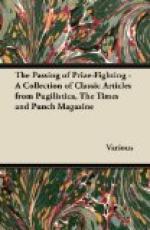What can they be up to? a gazer might
say,
As he watched their eccentric
career from the banks.
Three ’ARRIES at large on a Bank
Holiday
Could hardly indulge in more
blundering pranks.
Stroke “catches a crab” in
the clumsiest style,
(And they called him a fine
finished oarsman, this chap!)
At his “Catherine-wheeler”
a Cockney might smile,
As he tumbles so helplessly
back in Bow’s lap.
And Bow!—well, he’s snapped
off the blade of his scull,
And poor Cox’s steering-gear’s
all “in a mull.”
It’s all that Stroke’s fault—so
the whisper goes round.
He would try new dodges,
uncalled-for, unproved,
They were “going great guns,”
when he suddenly found
That, to make himself Champion
(and get himself loved
By the river-side “Bungs”
and their large clientele),
He must—set a new
stroke in the midst of a spin—
A policy plainly predestined to fail,
And one, we must own, scarce
deserving to win.
And so he has smashed up a shining success,
And got himself into a deuce of a mess.
So various voices! And this was the
oar
They triumphantly won from
a great rival crew;
The cool-headed, steady-nerved Stroke,
bound to score;
The fellow who funking or
failure ne’er knew.
He hurry, or falter, catch crabs,
miss, or muff?
No, no; lesser men might—say,
GL-DST-NE or SM-TH—
But he was not made of such common-place
stuff,
His nerve was all steel, and
his muscle all pith.
And now he’s adrift amidst snags,
stumps, and rooks,
And the Coxswain has just lost his rudder—poor
Cox.!
And danger’s ahead, and the full
of the weir
Sounds close, as that Stroke
tumbles “head over tip.”
No wonder poor Bow, his oar bladeless,
looks queer.
No wonder the Steersman his
yoke-lines lets slip.
The Three are “In Trouble,”
of that there’s no doubt;
Stroke mutters, “Obstruction!”
Bow talks of “a foul.”
But when you have muffed it, and foes
are about,
It isn’t much use at
bad fortune to growl.
No; Stroke, Bow, and Coxswain must “go
it like bricks,”
If they mean to get out of this troublesome
fix.
* * * * *
ERRATUM.—Mr. Punch last week paid the Notts’ Cricketer, GUNN, a well-deserved compliment on his great innings of 228 against the Australians. He intended to represent him as piling-up that huge score “against the best bowling.” The obviously accidental substitution of the word “batting” for “bowling” here, caused “the Nottingham Giant” to be credited with a novel cricketing performance, to which even he would hardly be equal. The proverbial Irish gun that could “shoot round a corner,” would not be “in it” with a GUNN who could “bat against batting!” As a Correspondent (in slightly different words) suggests:—




